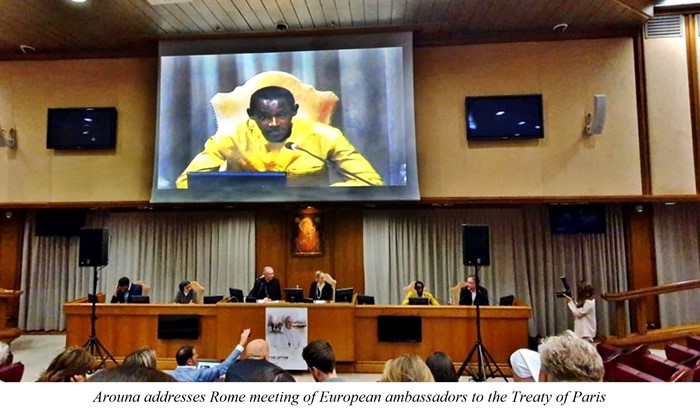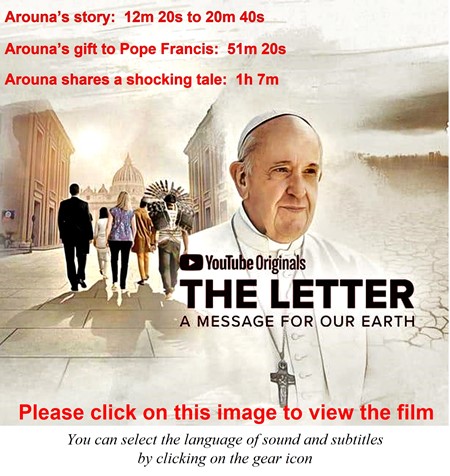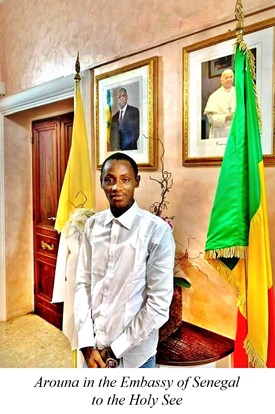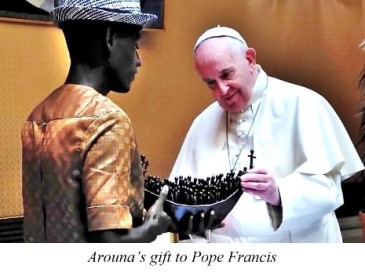News from Maison de la Gare
The Letter: A Message for our Earth
Tweeter
Arouna Kandé joins Pope Francis in seeing hope for the talibé children in this environmental call to action
This film translates the message of Pope Francis’s encyclical Laudato Si in a lively
and accessible way, through the lives of people from different continents. It includes
the story of Arouna, a talibé who grew up with Maison de la Gare’s support from the age
of six. After beginning formal schooling over a decade ago, he is now a student at
Senegal’s prestigious National School for Specialized Social Workers, ENTSS.

“The Letter” was produced with the support of the Vatican and includes a large segment
on Arouna's life, from his village to his time as a talibé in his daara in Saint Louis
and at Maison de la Gare. The film has been seen by millions of people.
Arouna was invited back to Rome for the official launch of “The Letter,” following on
his private audience with Pope Francis one year earlier. This is his report.
_____________
Climate change is perhaps the greatest challenge that humanity has had to face.
It is the basic reason why I was forced to leave my family and my home in rural Senegal
to move to a daara in Saint Louis. While there are other factors, like failure to
plant trees and government inaction on schools and other infrastructure, global
warming is the real driver.
Becoming a talibé has an enormous personal cost. We are not there to learn the Koran
or to live comfortably. 50 to 80 of us are packed in a small room. And,
fed by whom? By ourselves! If we don’t beg for our food, we won’t have any. And we
must also feed the marabout by begging for money to pay him. He uses this money to
live himself and to support his large family.
This history is why I was chosen to be one of the five protagonists of the "Laudato Si"
movement from different continents, from Senegal, India, Brazil, and the United States.

Filming of my part of “The Letter” was a major focus of my life for close to a year.
Through my story and those of the other protagonists, the film documents the consequences
of global warming in the hope of inspiring the necessary actions around the globe.
I was invited to Rome by Pope Francis and the Vatican for the film’s release in October
2022. The pope and many others welcomed me warmly. The pope expressed his pleasure at
meeting me again, and we spoke for an hour. We talked about the problems of the
environmental crisis that we (the five protagonists) had demonstrated in the film, the
problem of immigration of young people, the lack of political courage of African leaders,
but also the injustice that we suffer every day.
After a moment of silence, Pope Francis stood and said to me: “Mr. Arouna Kandé, what do
you plan to do as a project once you return to Senegal? And in the future?”
I answered that I will continue my studies because I want to be a social worker to help
the youth of my community. But also, I will promote the development of my village
economically, socially, environmentally and in terms of health and hygiene. I intend to
involve all the young people and all the inhabitants of my community so that they will
not have to live the misadventures and abuses that I have lived.
I would also like to help the inhabitants of my village to value what there was in the
past. How we used to live by planting trees, by helping each other.
 We must go back
to our roots and these roots are the natural environment. And we must complement it
with infrastructure, schools, and hospitals.
We must go back
to our roots and these roots are the natural environment. And we must complement it
with infrastructure, schools, and hospitals.
Global warming has resulted in many wrongs in our lives. It has pushed us to be talibés,
to be street children and to support ourselves as children until we grow up to evolve
in a society where we have to fight to find a place. I fought to become a pupil, to
become a schoolboy, and to become a college student. This is where I am now. I will
continue to fight so that my village can be a place where children and families can
grow and live. What is needed? It is basic education, civic-mindedness, respect for
human beings, respect for the environment, and respect for nature.
I really want to an ambassador of my own country, not in Rome or Saint Louis, but where
I was born, in my own village. I am convinced that the solutions to fight this
phenomenon are in our hands. By going back to our roots, to nature, and by developing
our communities in a sustainable way, we will offer hope to thousands of young people
who are desperately looking for better lives.

